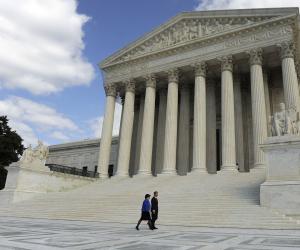On Sept. 8, a case brought before the Fourth Circuit challenging the constitutionality of the Patient Protection and Affordable Care Act and its individual mandate was remanded to lower courts in a disappointing decision. In Liberty University, Inc. v. Geithner, Liberty University asserted that the individual mandate was unconstitutional on the grounds that it “exceeds Congress’ authority under the Commerce Clause of the Constitution,” and that according to the Taxing and Spending Clause, Congress does not have the power “to impose taxes upon citizens who choose not to purchase something.”
However, the Fourth Circuit found that any “exaction for support of the government” can be considered a tax, even if it “furthers a revenue purpose ‘secondary’ to the primary goal of the legislation,” meaning that fines can be considered taxes if that is what it takes for them to be constitutional under the Taxing and Spending Clause. The Court also found that Congress’ actions were within the scope of the Commerce Clause, as the billions of dollars of healthcare costs passed on by the uninsured to the insured has a “substantial effect on interstate commerce,” and “activities having a substantial relation to interstate commerce” fall under the Commerce Clause according U.S. v. Lopez.
The U.S. Appeals Court for the District of Columbia recently went a step further than the Fourth Circuit, upholding the constitutionality of the bill. To settle the issue once and for all, the Supreme Court has agreed to take a look at the constitutionality of the act.
With the Court’s tendency to lean in favor of more liberal policies, it is expected that the healthcare bill will be found to be constitutional. Many of the people that I’ve talked to are upset about this, but I see an affirmation of the bill’s constitutionality as an opportunity. Allow me to explain.
In the 1942 case Wickard v. Filburn, the Supreme Court held that Roscoe Filburn’s consumption of wheat that he grew on his own farm had “a substantial effect in defeating and obstructing [Congress’] purpose to stimulate trade at increased prices.” Therefore, the fine he was forced to pay for exceeding the federal limit on wheat production was held to be constitutional.
Nearly 65 years later, the application of the federal Controlled Substances Act against two women using homegrown medical marijuana in California (see Gonzales v. Raich) was only held to be constitutional because of the Court’s decision in Wickard v. Filburn. Moreover, one 2004 estimate suggests that there exist more than 4,000 federal statutory crimes, most of which were drafted after Wickard v. Filburn granted the federal government more power to regulate.
My point is that even though Wickard upheld a liberal New Deal policy, it has been used by Republican administrations to further conservative agendas. There is no reason why a further expansion of the power granted by the Commerce Clause or Taxing and Spending Clause could not be used by the next Republican administration, which should take over in 2013, to further its policies.
As the penalty one faces for not purchasing healthcare is in essence a fine, intended to “regulate and punish,” not a tax in the understood sense of the word, an affirmation of its constitutionality would open the door for a Republican congress to impose fines disguised as taxes on doctors in Oregon and Washington who participate in assisted suicides. Even better, those states’ assisted suicide laws could be voided by the enactment of a federal law prohibiting assisted suicide, assuming that the Supreme Court expands the Commerce Clause with this healthcare case.
Another possible scenario that I could envision is a federal mandate requiring prohibiting states from refusing to execute convicts sentenced to death by state courts. The reasoning, which would be in the spirit of Wickard, could be that by not executing the prisoner, the state is having “a substantial effect on interstate commerce” by not purchasing the necessary drugs from the Illinois based Hospira Incorporated. The “gutless” Oregon Gov. John Kitzhaber recently refused to allow executions while he is in office, so this healthcare case could be useful.
I don’t know how the Supreme Court will rule, but an expansion of the Commerce Clause may not be such a bad thing. Future Republican Congresses can repeal the Patient Protection and Affordable Care Act, and then use the decision to pass unpopular federal policies. After Wickard, Republican Congresses were able to pass thousands of new criminal statutes and business laws. Maybe after this case, the door will be opened for them to enact new policies.
Ondo is a member of
the class of 2014.





